PUBH641: Developing Skills in Systematic Review and Critical Appraisal
VerifiedAdded on 2023/03/31
|5
|999
|301
AI Summary
This reflective paper discusses a public health student's experience in completing systematic reviews and critical appraisals, focusing on the PUBH641 course content. The student details their initial lack of knowledge and subsequent learning about systematic review processes, including formulating research questions, identifying relevant studies, and using search strategies. They also explore critical appraisal techniques using CASP checklists to evaluate the quality and validity of research papers. The reflection highlights the development of skills in assessing bias and confounders, ultimately building confidence in evidence-based practice for a future career as a public health practitioner. The student emphasizes the importance of these skills for clarifying doubts in practice and engaging in evidence-based decision-making.
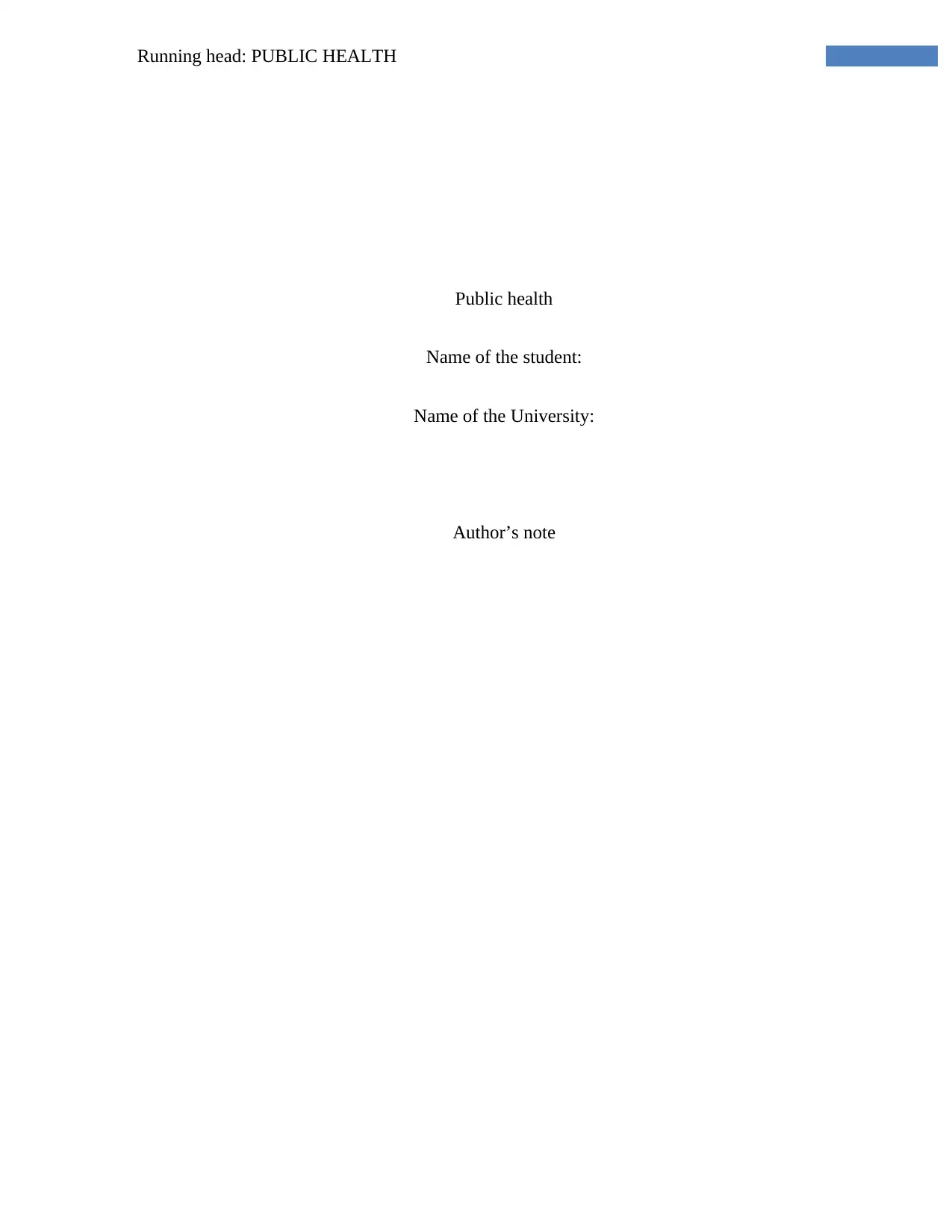
Running head: PUBLIC HEALTH
Public health
Name of the student:
Name of the University:
Author’s note
Public health
Name of the student:
Name of the University:
Author’s note
Paraphrase This Document
Need a fresh take? Get an instant paraphrase of this document with our AI Paraphraser
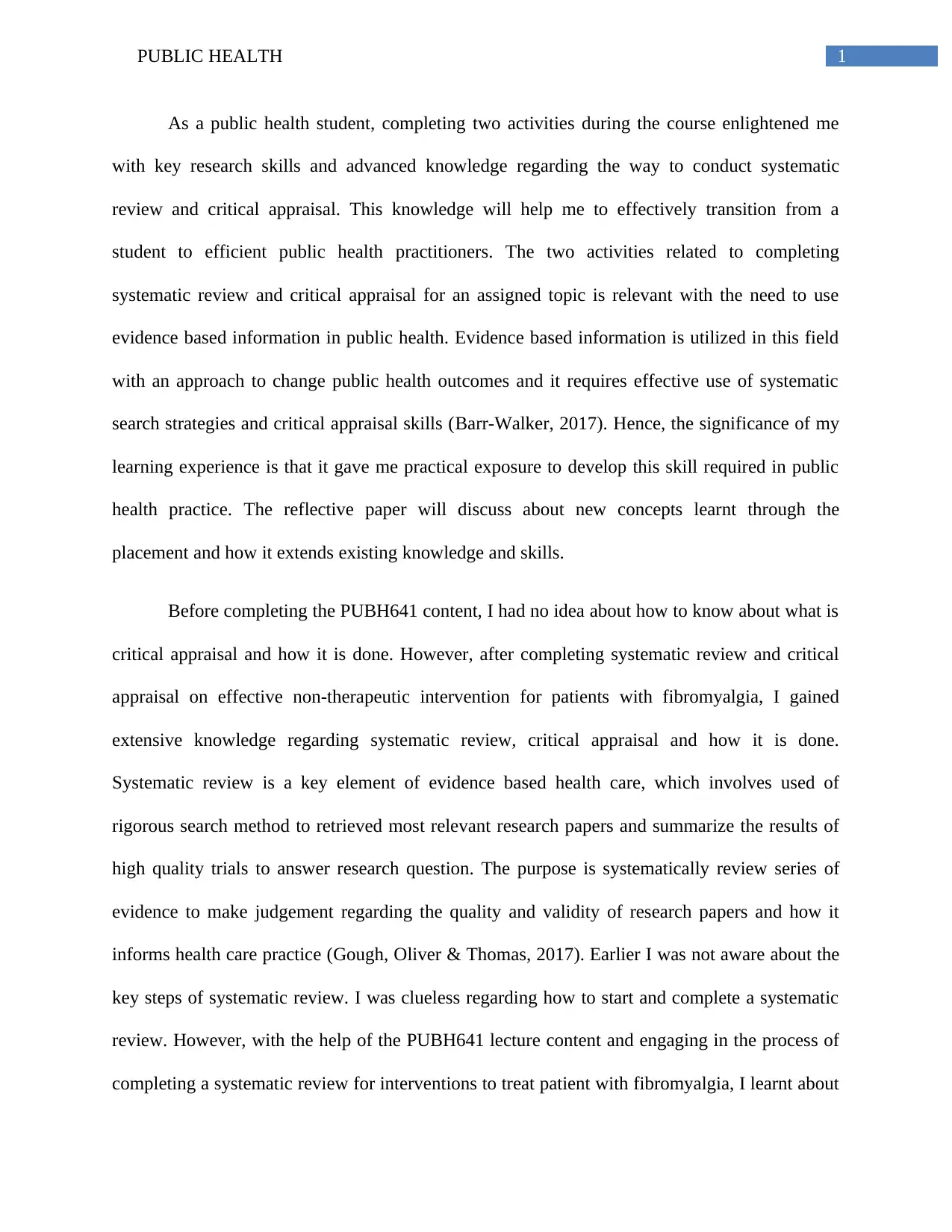
1PUBLIC HEALTH
As a public health student, completing two activities during the course enlightened me
with key research skills and advanced knowledge regarding the way to conduct systematic
review and critical appraisal. This knowledge will help me to effectively transition from a
student to efficient public health practitioners. The two activities related to completing
systematic review and critical appraisal for an assigned topic is relevant with the need to use
evidence based information in public health. Evidence based information is utilized in this field
with an approach to change public health outcomes and it requires effective use of systematic
search strategies and critical appraisal skills (Barr-Walker, 2017). Hence, the significance of my
learning experience is that it gave me practical exposure to develop this skill required in public
health practice. The reflective paper will discuss about new concepts learnt through the
placement and how it extends existing knowledge and skills.
Before completing the PUBH641 content, I had no idea about how to know about what is
critical appraisal and how it is done. However, after completing systematic review and critical
appraisal on effective non-therapeutic intervention for patients with fibromyalgia, I gained
extensive knowledge regarding systematic review, critical appraisal and how it is done.
Systematic review is a key element of evidence based health care, which involves used of
rigorous search method to retrieved most relevant research papers and summarize the results of
high quality trials to answer research question. The purpose is systematically review series of
evidence to make judgement regarding the quality and validity of research papers and how it
informs health care practice (Gough, Oliver & Thomas, 2017). Earlier I was not aware about the
key steps of systematic review. I was clueless regarding how to start and complete a systematic
review. However, with the help of the PUBH641 lecture content and engaging in the process of
completing a systematic review for interventions to treat patient with fibromyalgia, I learnt about
As a public health student, completing two activities during the course enlightened me
with key research skills and advanced knowledge regarding the way to conduct systematic
review and critical appraisal. This knowledge will help me to effectively transition from a
student to efficient public health practitioners. The two activities related to completing
systematic review and critical appraisal for an assigned topic is relevant with the need to use
evidence based information in public health. Evidence based information is utilized in this field
with an approach to change public health outcomes and it requires effective use of systematic
search strategies and critical appraisal skills (Barr-Walker, 2017). Hence, the significance of my
learning experience is that it gave me practical exposure to develop this skill required in public
health practice. The reflective paper will discuss about new concepts learnt through the
placement and how it extends existing knowledge and skills.
Before completing the PUBH641 content, I had no idea about how to know about what is
critical appraisal and how it is done. However, after completing systematic review and critical
appraisal on effective non-therapeutic intervention for patients with fibromyalgia, I gained
extensive knowledge regarding systematic review, critical appraisal and how it is done.
Systematic review is a key element of evidence based health care, which involves used of
rigorous search method to retrieved most relevant research papers and summarize the results of
high quality trials to answer research question. The purpose is systematically review series of
evidence to make judgement regarding the quality and validity of research papers and how it
informs health care practice (Gough, Oliver & Thomas, 2017). Earlier I was not aware about the
key steps of systematic review. I was clueless regarding how to start and complete a systematic
review. However, with the help of the PUBH641 lecture content and engaging in the process of
completing a systematic review for interventions to treat patient with fibromyalgia, I learnt about
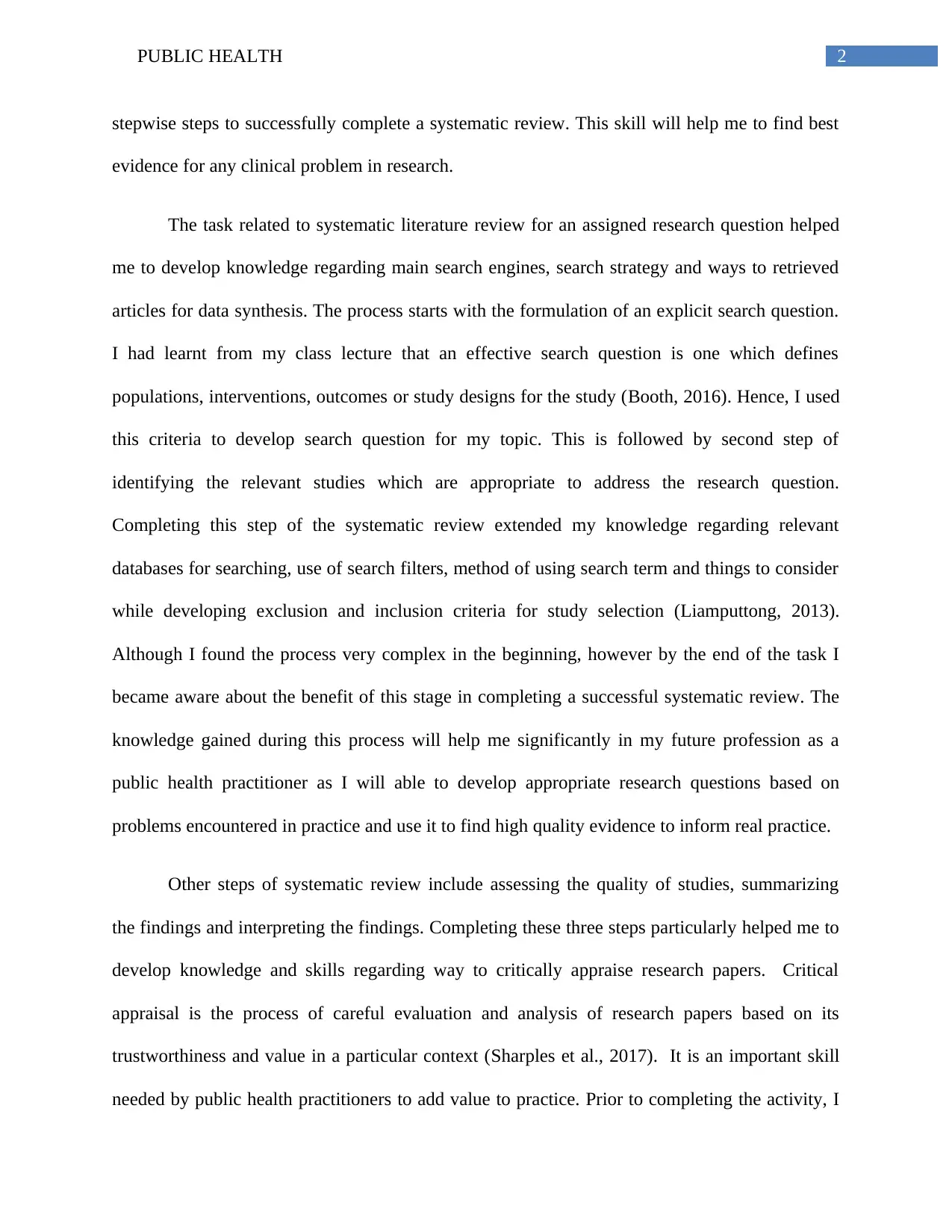
2PUBLIC HEALTH
stepwise steps to successfully complete a systematic review. This skill will help me to find best
evidence for any clinical problem in research.
The task related to systematic literature review for an assigned research question helped
me to develop knowledge regarding main search engines, search strategy and ways to retrieved
articles for data synthesis. The process starts with the formulation of an explicit search question.
I had learnt from my class lecture that an effective search question is one which defines
populations, interventions, outcomes or study designs for the study (Booth, 2016). Hence, I used
this criteria to develop search question for my topic. This is followed by second step of
identifying the relevant studies which are appropriate to address the research question.
Completing this step of the systematic review extended my knowledge regarding relevant
databases for searching, use of search filters, method of using search term and things to consider
while developing exclusion and inclusion criteria for study selection (Liamputtong, 2013).
Although I found the process very complex in the beginning, however by the end of the task I
became aware about the benefit of this stage in completing a successful systematic review. The
knowledge gained during this process will help me significantly in my future profession as a
public health practitioner as I will able to develop appropriate research questions based on
problems encountered in practice and use it to find high quality evidence to inform real practice.
Other steps of systematic review include assessing the quality of studies, summarizing
the findings and interpreting the findings. Completing these three steps particularly helped me to
develop knowledge and skills regarding way to critically appraise research papers. Critical
appraisal is the process of careful evaluation and analysis of research papers based on its
trustworthiness and value in a particular context (Sharples et al., 2017). It is an important skill
needed by public health practitioners to add value to practice. Prior to completing the activity, I
stepwise steps to successfully complete a systematic review. This skill will help me to find best
evidence for any clinical problem in research.
The task related to systematic literature review for an assigned research question helped
me to develop knowledge regarding main search engines, search strategy and ways to retrieved
articles for data synthesis. The process starts with the formulation of an explicit search question.
I had learnt from my class lecture that an effective search question is one which defines
populations, interventions, outcomes or study designs for the study (Booth, 2016). Hence, I used
this criteria to develop search question for my topic. This is followed by second step of
identifying the relevant studies which are appropriate to address the research question.
Completing this step of the systematic review extended my knowledge regarding relevant
databases for searching, use of search filters, method of using search term and things to consider
while developing exclusion and inclusion criteria for study selection (Liamputtong, 2013).
Although I found the process very complex in the beginning, however by the end of the task I
became aware about the benefit of this stage in completing a successful systematic review. The
knowledge gained during this process will help me significantly in my future profession as a
public health practitioner as I will able to develop appropriate research questions based on
problems encountered in practice and use it to find high quality evidence to inform real practice.
Other steps of systematic review include assessing the quality of studies, summarizing
the findings and interpreting the findings. Completing these three steps particularly helped me to
develop knowledge and skills regarding way to critically appraise research papers. Critical
appraisal is the process of careful evaluation and analysis of research papers based on its
trustworthiness and value in a particular context (Sharples et al., 2017). It is an important skill
needed by public health practitioners to add value to practice. Prior to completing the activity, I
⊘ This is a preview!⊘
Do you want full access?
Subscribe today to unlock all pages.

Trusted by 1+ million students worldwide
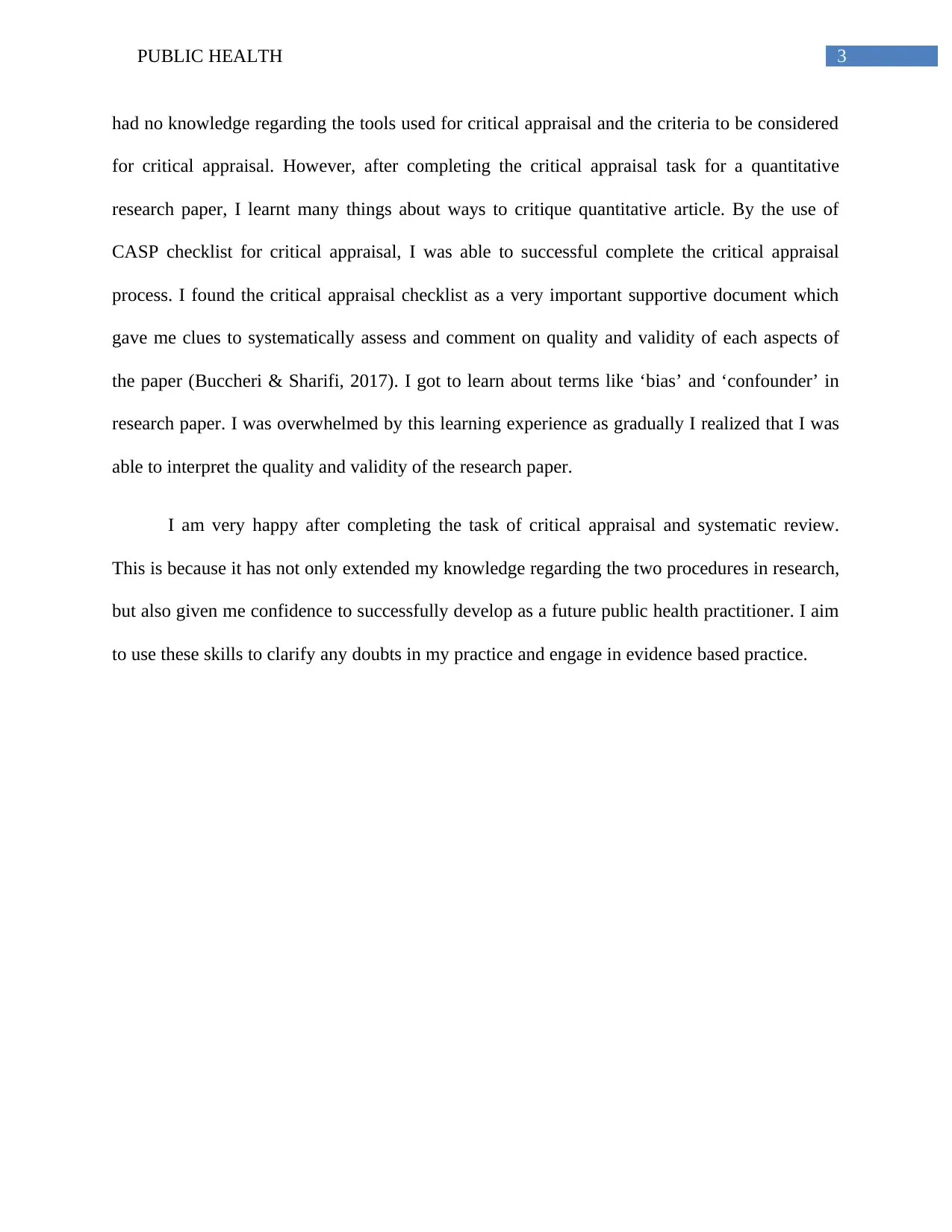
3PUBLIC HEALTH
had no knowledge regarding the tools used for critical appraisal and the criteria to be considered
for critical appraisal. However, after completing the critical appraisal task for a quantitative
research paper, I learnt many things about ways to critique quantitative article. By the use of
CASP checklist for critical appraisal, I was able to successful complete the critical appraisal
process. I found the critical appraisal checklist as a very important supportive document which
gave me clues to systematically assess and comment on quality and validity of each aspects of
the paper (Buccheri & Sharifi, 2017). I got to learn about terms like ‘bias’ and ‘confounder’ in
research paper. I was overwhelmed by this learning experience as gradually I realized that I was
able to interpret the quality and validity of the research paper.
I am very happy after completing the task of critical appraisal and systematic review.
This is because it has not only extended my knowledge regarding the two procedures in research,
but also given me confidence to successfully develop as a future public health practitioner. I aim
to use these skills to clarify any doubts in my practice and engage in evidence based practice.
had no knowledge regarding the tools used for critical appraisal and the criteria to be considered
for critical appraisal. However, after completing the critical appraisal task for a quantitative
research paper, I learnt many things about ways to critique quantitative article. By the use of
CASP checklist for critical appraisal, I was able to successful complete the critical appraisal
process. I found the critical appraisal checklist as a very important supportive document which
gave me clues to systematically assess and comment on quality and validity of each aspects of
the paper (Buccheri & Sharifi, 2017). I got to learn about terms like ‘bias’ and ‘confounder’ in
research paper. I was overwhelmed by this learning experience as gradually I realized that I was
able to interpret the quality and validity of the research paper.
I am very happy after completing the task of critical appraisal and systematic review.
This is because it has not only extended my knowledge regarding the two procedures in research,
but also given me confidence to successfully develop as a future public health practitioner. I aim
to use these skills to clarify any doubts in my practice and engage in evidence based practice.
Paraphrase This Document
Need a fresh take? Get an instant paraphrase of this document with our AI Paraphraser
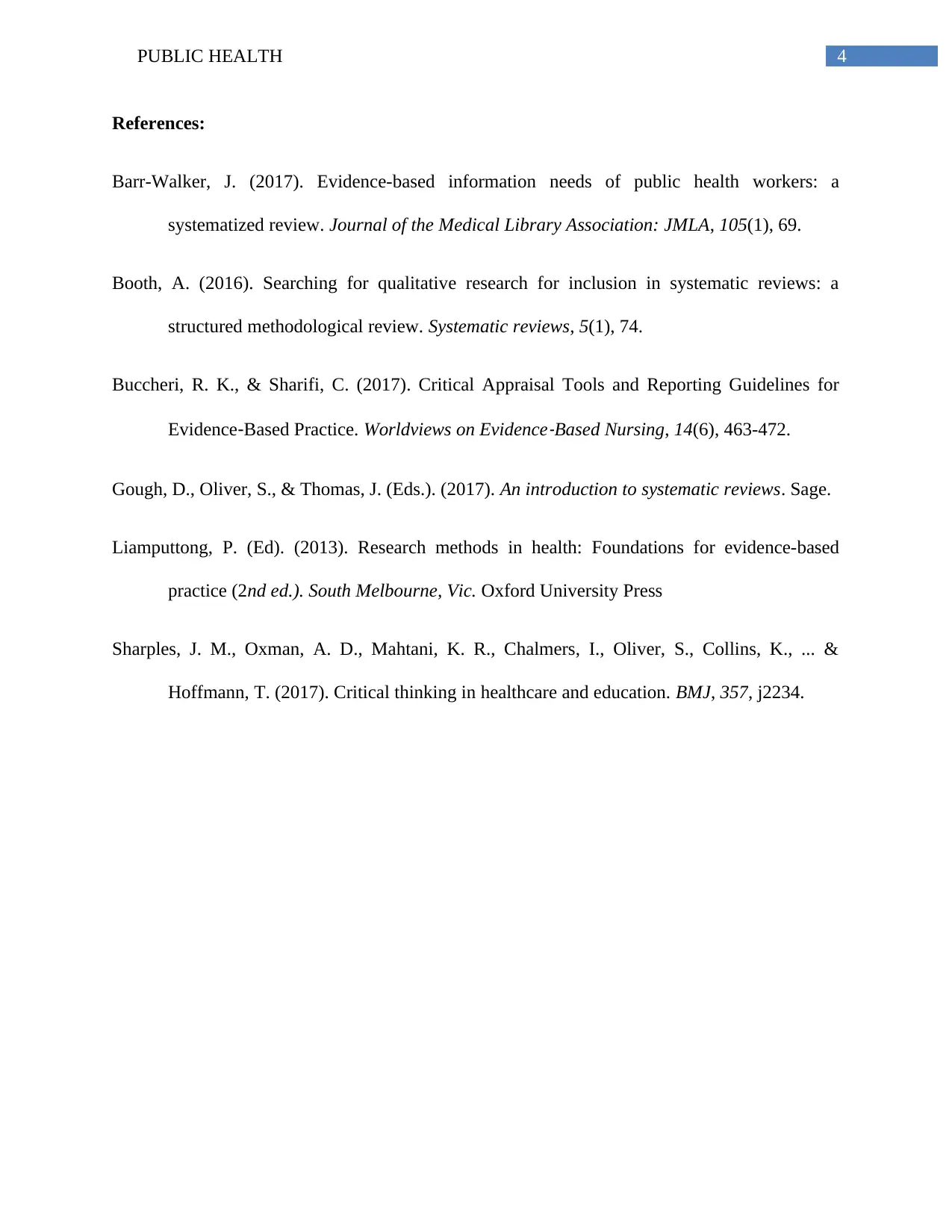
4PUBLIC HEALTH
References:
Barr-Walker, J. (2017). Evidence-based information needs of public health workers: a
systematized review. Journal of the Medical Library Association: JMLA, 105(1), 69.
Booth, A. (2016). Searching for qualitative research for inclusion in systematic reviews: a
structured methodological review. Systematic reviews, 5(1), 74.
Buccheri, R. K., & Sharifi, C. (2017). Critical Appraisal Tools and Reporting Guidelines for
Evidence‐Based Practice. Worldviews on Evidence
‐Based Nursing, 14(6), 463-472.
Gough, D., Oliver, S., & Thomas, J. (Eds.). (2017). An introduction to systematic reviews. Sage.
Liamputtong, P. (Ed). (2013). Research methods in health: Foundations for evidence-based
practice (2nd ed.). South Melbourne, Vic. Oxford University Press
Sharples, J. M., Oxman, A. D., Mahtani, K. R., Chalmers, I., Oliver, S., Collins, K., ... &
Hoffmann, T. (2017). Critical thinking in healthcare and education. BMJ, 357, j2234.
References:
Barr-Walker, J. (2017). Evidence-based information needs of public health workers: a
systematized review. Journal of the Medical Library Association: JMLA, 105(1), 69.
Booth, A. (2016). Searching for qualitative research for inclusion in systematic reviews: a
structured methodological review. Systematic reviews, 5(1), 74.
Buccheri, R. K., & Sharifi, C. (2017). Critical Appraisal Tools and Reporting Guidelines for
Evidence‐Based Practice. Worldviews on Evidence
‐Based Nursing, 14(6), 463-472.
Gough, D., Oliver, S., & Thomas, J. (Eds.). (2017). An introduction to systematic reviews. Sage.
Liamputtong, P. (Ed). (2013). Research methods in health: Foundations for evidence-based
practice (2nd ed.). South Melbourne, Vic. Oxford University Press
Sharples, J. M., Oxman, A. D., Mahtani, K. R., Chalmers, I., Oliver, S., Collins, K., ... &
Hoffmann, T. (2017). Critical thinking in healthcare and education. BMJ, 357, j2234.
1 out of 5
Related Documents
Your All-in-One AI-Powered Toolkit for Academic Success.
+13062052269
info@desklib.com
Available 24*7 on WhatsApp / Email
![[object Object]](/_next/static/media/star-bottom.7253800d.svg)
Unlock your academic potential
Copyright © 2020–2026 A2Z Services. All Rights Reserved. Developed and managed by ZUCOL.



